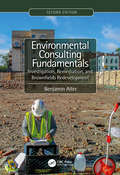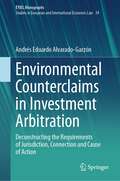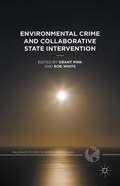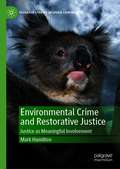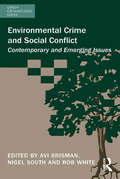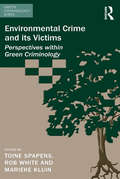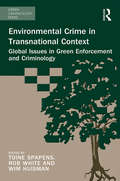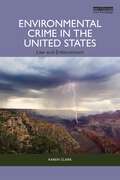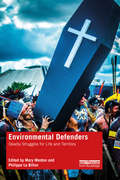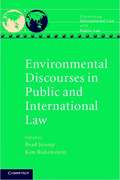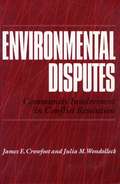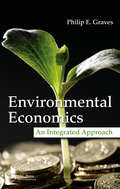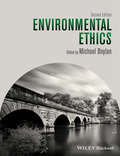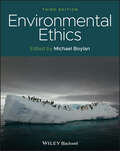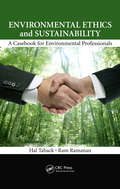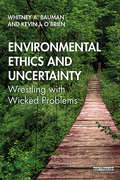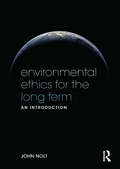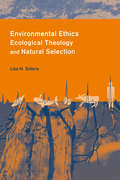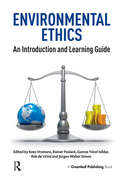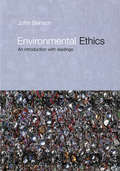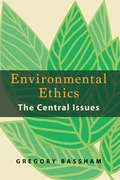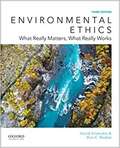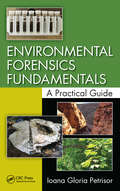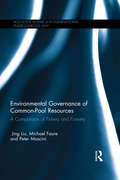- Table View
- List View
Environmental Consulting Fundamentals: Investigation, Remediation, and Brownfields Redevelopment, Second Edition
by Benjamin AlterThis book is a primer for those interested in a career in this dynamic, multidisciplinary field as well as a handy reference for practicing consultants. Combining theory and practice advice into a concise, readable format, the book is an accessible introduction to the types of projects you will encounter as an environmental consultant and lays the groundwork for what you’ll need to know in this challenging and rewarding profession. Also available with this book, under the Additional Resources tab, are PowerPoint lectures that correspond with each chapter. New in the Second Edition Covers the latest environmental issues, including emerging contaminants, and the latest technological advances in environmental investigation and remediation New chapters dedicated to vapor intrusion investigation and mitigation and to Brownfields redevelopment and project financing. An expanded chapter describing the staffing, budgeting, and execution of environmental projects. Descriptions of the remediation processes under RCRA and Superfund Descriptions on how each chapter’s subject matter applies to the job of the environmental consultant. Dozens of new figures, photographs, and tables designed to enhance the reader’s understanding of the subject matter. Problems and questions to be used for homework assignments or classroom discussions.
Environmental Counterclaims in Investment Arbitration: Deconstructing the Requirements of Jurisdiction, Connection and Cause of Action (European Yearbook of International Economic Law #34)
by Andrés Eduardo Alvarado-GarzónThis book critically analyses the availability of environmental counterclaims in investment arbitration presented by the respondent host state against the claimant investor. It starts from the premise that the conflicting relation between investment law and environmental protection cannot always be avoided. Yet, the instrument of environmental counterclaims in investment arbitration might alleviate such relation. Throughout its chapters, this book addresses the questions about the societal and practical relevance of seeking redress for environmental damage in investment arbitration, the functioning of such instrument both in contract-based and treaty-based investment arbitration, the suitability of arbitral tribunals to rule upon environmental issues, and the kind of environmental damages that could be redressed. Most importantly, by deconstructing the requirements of jurisdiction, connection between main claim and counterclaim, and cause of action, this book provides the tools for the re-conceptualisation of the instrument of counterclaims with the hope of harnessing its utility to achieve appropriate redress for environmental damages caused by foreign investors.
Environmental Crime and Collaborative State Intervention (Palgrave Studies In Green Criminology Ser.)
by Rob White Grant PinkThis book examines the role and practical dynamics of governmental environmental law enforcement agencies and individuals who combat environmental crime. It will inform researchers about the 'real world' experiences of practitioners and provide an intellectual space for practitioners to examine critically what it is they do and why.
Environmental Crime and Restorative Justice: Justice as Meaningful Involvement (Palgrave Studies in Green Criminology)
by Mark HamiltonThis book explores the use of restorative justice approaches in the context of environmental crimes. It critically assesses regular criminal justice approaches with regard to green crimes and explores restorative justice conferencing as an alternative. Focussing on justice approaches in Australia and New Zealand, it argues that court processes following environmental offending provide minimal to no offender and victim voice, interaction, and input, rendering them invisible. It proposes a third measure of justice – that of meaningful involvement, beyond that of fair procedure and outcome. It suggests the use of restorative justice conferencing, a facilitated dialogue between stakeholders to crime or conflict, as a vehicle to operationalise and achieve justice as meaningful involvement. This book speaks to those interested in green criminology, victimology and environmental law.
Environmental Crime and Social Conflict: Contemporary and Emerging Issues (Green Criminology)
by Rob White Avi Brisman Nigel SouthThis impressive collection of original essays explores the relationship between social conflict and the environment - a topic that has received little attention within criminology. The chapters provide a systematic and comprehensive introduction and overview of conflict situations stemming from human exploitation of environments, as well as the impact of social conflicts on the wellbeing and health of specific species and ecosystems. Largely informed by green criminology perspectives, the chapters in the book are intended to stimulate new understandings of the relationships between humans and nature through critical evaluation of environmental destruction and degradation associated with social conflicts occurring around the world. With a goal of creating a typology of environment-social conflict relationships useful for green criminological research, this study is essential reading for scholars and academics in criminology, as well as those interested in crime, law and justice.
Environmental Crime and its Victims: Perspectives within Green Criminology (Green Criminology)
by Rob White Toine Spapens Marieke KluinEnvironmental crime is one of the most profitable and fastest growing areas of international criminal activity. These types of crime, however, do not always produce an immediate consequence, and the harm may be diffused. As such, the complexity of victimization - in terms of time, space, impact, and who or what is victimized - is one of the reasons why governments and the enforcement community have trouble in finding suitable and effective responses. This book provides a diverse and provocative array of arguments, critiques and recommendations from leading researchers and scholars in the field of green criminology. The chapters are divided into three main sections: the first part deals with specific characteristics of some of the major types of environmental crime and its perpetrators; the second focuses explicitly on the problem of victimization in cases of environmental crime; and the third addresses the question of how to tackle this problem. Discussing these topics from the point of view of green criminological theory, sociology, law enforcement, community wellbeing, environmental activism and victimology, this book will be of great interest to all those concerned about crime and the environment.
Environmental Crime in Transnational Context: Global Issues in Green Enforcement and Criminology (Green Criminology)
by Rob White Toine Spapens Wim HuismanEnvironmental crime is one of the most profitable and fastest growing areas of international criminal activity. The increasing cross-border scope of environmental crimes and harms is one of the reasons why governments and the enforcement community have trouble in finding the proper responses. Law enforcement cooperation between western industrialized states is often time consuming and problematic, and the problems increase exponentially when environmental criminals take advantage of situations where government and law enforcement are weak. This book provides an overview of the developments and problems in the field of transnational environmental crimes and harms, addressing these issues from perspectives such as enforcement, deterrence, compliance and emission trading schemes. Divided into four parts, the authors consider global issues in green criminology, responses to transnational environmental crimes and harms, alternative methods to combat environmental crime, and specific types of crimes and criminological research. Discussing these topics from the view of green criminology, sociology and governance, this book will be of great interest to all those concerned about the transnational dimensions of crime and the environment.
Environmental Crime in the United States: Law and Enforcement
by Karen ClarkEnvironmental Crime in the United States provides an introduction to the laws that govern environmental crime, how these laws are implemented and enforced, and the impact they have had since their passing in the twentieth century and their continued applications.Environmental crimes such as wildlife trafficking, over‑fishing, artisanal mining, and deforestation are lucrative contributors to a global illicit trade market and sources of cheap resources for corporations to exploit. This book presents a review of U.S.‑based laws and regulations regarding such environmental crimes at the state and federal level, combined with examples of international convention or trade agreements which can be prosecuted within the United States. It examines attempts to modify these laws, the exceptions granted to prevent enforcement, and the ability of political and social groups to address inefficiencies of the laws or their implementations. Both criminal and administrative laws are reviewed to assess how laws governing the environment compare to other areas of law that seek to protect and improve social well‑being and public health; this includes a review of how environmental crimes overlap with general crimes, and how these crimes fuel illicit commerce while strengthening international crime syndicates. Trends such as the actions taken by non‑governmental organizations and other entities other than law enforcement to stop environmental crimes such as poaching will be explained, with a discussion of how environmental crimes spurn illicit markets and provide lucrative schemes for international crime rings as well as corporations.This book will be of great interest to students of environmental crime and justice, green criminology, environmental conservation, natural resource management, and environmental law.
Environmental Defenders: Deadly Struggles for Life and Territory (Routledge Explorations in Environmental Studies)
by Mary Menton; Philippe Le BillonThis book is about environmental defenders and the violence they face while seeking to protect their land and the environment. Between 2002 and 2019, at least two thousand people were killed in 57 countries for defending their lands and the environment. Recent policy initiatives and media coverage have provided much needed attention to the protection and support of defenders, but there has so far been little scholarly work. This edited volume explains who these defenders are, what threats they face, and what can be done to help support and protect them. Delving deep into the complex relations between and within communities, corporations, and government authorities, the book highlights the diversity of defenders, the collective character of their struggles, the many drivers and forms of violence they are facing, as well as the importance of emotions and gendered dimensions in protests and repression. Drawing on global case studies, it examines the violence taking place around different types of development projects, including fossil fuels, agro-industrial, renewable energy, and infrastructure. The volume also examines the violence surrounding conservation projects, including through militarized wildlife protection and surveillance technologies. The book concludes with a reflection on the perspectives of defenders about the best ways to support and protect them. It contrasts these with the lagging efforts of an international community often promoting economic growth over the lives of defenders. This volume is essential reading for all interested in understanding the challenges faced by environmental defenders and how to help and support them. It will also appeal to students, scholars and practitioners involved in environmental protection, environmental activism, human rights, social movements and development studies.
Environmental Discourses in Public and International Law
by Kim Rubenstein Brad JessupThis collection of essays examines the development and application of environmental laws and the relationship between public laws and international law. Notions of good governance, transparency and fairness in decision-making are analysed within the area of the law perceived as having the greatest potential to address today's global environmental concerns. International trends, such as free trade and environmental markets, are also observed to be infiltrating national laws. Together, the essays illustrate the idea that in the context of environmental problems being dynamic and environmental changes appearing suddenly, laws become difficult to design and effect. Typically, they are also devised within a conflicted setting. It is in this changeable and discordant context that environmental discourses such as precaution, justice, risk, equity, security, citizenship and markets contribute to legal responses, present legal opportunities or hinder progress.
Environmental Disputes: Community Involvement In Conflict Resolution (Environment, Development And Public Policy: Environmental Policy And Planning Ser.)
by Julia M. Wondolleck James CrowfootEnvironmental Disputes helps citizen groups, businesses, and governments understand how Environmental Dispute Settlement--a set of procedures for settling disputes over environmental policies without litigation--can work for them.
Environmental Economics: An Integrated Approach
by Philip E. GravesRigorous, yet written in a way that facilitates understanding of complex material, Environmental Economics: An Integrated Approach provides practical and working knowledge of how environmental policy analysis is developed. This is a true textbook, detailing the tools required to conduct that analysis and also discusses weaknesses in the existing me
Environmental Ethics
by Michael BoylanThe second edition of Environmental Ethics combines a strong theoretical foundation with applications to some of the most pressing environmental problems. Through a mix of classic and new essays, it discusses applied issues such as pollution, climate change, animal rights, biodiversity, and sustainability. Roughly half of the selections are original essays new to this edition.Accessible introduction for beginners, including important established essays and new essays commissioned especially for the volumeRoughly half of the selections are original essays new to this edition, including an entirely new chapter on Pollution and climate change and a new section on SustainabilityIncludes new material on ethical theory as a grounding for understanding the ethical dimensions of the environment, our interactions with it, and our place in itThe text incorporates helpful pedagogy, including extensive editorial material, cases, and study questionsIncludes key information on recent developments in the fieldPresents a carefully selected set of readings designed to progressively move the reader to competency in subject comprehension and essay writing
Environmental Ethics
by Michael BoylanThe latest edition of an essential resource in the theory and applications of environmental ethics In the newly revised Third Edition of Environmental Ethics, internationally renowned philosopher Michael Boylan delivers another accessible introduction for students new to ethics, and an invaluable reference for scholars of all levels. The anthology includes important essays, both established and contemporary, as well as eight brand-new contributions commissioned specifically for this edition. This new material is the foundation for students# understanding of the most recent ethical debates on the environment and humanity's place within it. The balanced combination of new material on recent developments in the field and well-known, foundational articles appears alongside helpful pedagogical materials, including case studies and sample questions. The book brings students up to speed on all the main themes in the area, including worldview arguments for environmentalism, the anthropocentric vs. biocentric debate, and a variety of applied environmental problems. Environmental Ethics also offers: A thorough introduction to the theoretical background of environmental ethics, including discussions of ethical reasoning, nature, and the tragedy of the commons Comprehensive explorations of eco-feminism and social justice, aesthetics, and deep ecology Practical discussions of anthropocentric and biocentric justifications in environmental ethics In-depth examinations of applied environmental problems, including climate change, animal rights, sustainability, and public policy Perfect for undergraduate and graduate students studying topics in ethics, the environment, law, and policy, Environmental Ethics will also earn a place in the libraries of philosophers with an interest in applied or environmental ethics, and industry consultants to ecologists, environmental scientists, or environmental policymakers.
Environmental Ethics and Sustainability: A Casebook for Environmental Professionals
by Hal Taback Ram RamananThe environmental professional must be educated to be ethical, and more importantly, trained through frequent participatory workshops with real-world scenarios to be able to make the right choices when faced with environmental dilemmas. This book serves as a reference and a resource casebook, presenting current real-world situations and providing perspectives to numerous environmental ethics scenarios. It provides specific guidance as to what is ethical behavior, how to judge it, and the foundations of ethical behavior in facing and resolving environmental ethical dilemmas.
Environmental Ethics and Uncertainty: Wrestling with Wicked Problems
by Whitney A. Bauman Kevin J. O'BrienThis book offers a multidisciplinary environmental approach to ethics in response to the contemporary challenge of climate change caused by globalized economics and consumption. This book synthesizes the incredible complexity of the problem and the necessity of action in response, highlighting the unambiguous problem facing humanity in the 21st century, but arguing that it is essential to develop an ethics housed in ambiguity in response. Environmental Ethics and Uncertainty is divided into theoretical and applied chapters, with the theoretical sections engaging in dialogue with scholars from a variety of disciplines, while the applied chapters offer insight from 20th century activists who demonstrate and/or illuminate the theory, including Martin Luther King, Rachel Carson, and Frank Lloyd Wright. This book is written for scholars and students in the interdisciplinary field of environmental studies and the environmental humanities, and will appeal to courses in religion, philosophy, ethics, politics, and social theory.
Environmental Ethics for the Long Term: An Introduction
by John NoltBroad in scope, this introduction to environmental ethics considers both contemporary issues and the extent of humanity's responsibility for distant future life. John Nolt, a logician and environmental ethicist, interweaves contemporary science, logical analysis, and ethical theory into the story of the expansion of ethics beyond the human species and into the far future. Informed by contemporary environmental science, the book deduces concrete policy recommendations from carefully justified ethical principles and ends with speculations concerning the deepest problems of environmental ethics. Pedagogical features include chapter outlines, annotated suggestions for further readings, the explanations of key terms when first mentioned, and an extensive glossary.
Environmental Ethics, Ecological Theology, and Natural Selection: Suffering and Responsibility
by Lisa SiderisLisa Sideris proposes a new way of thinking about the natural world, an environmental ethic that incorporates the ideas of natural selection and values the processes rather than the products of nature. Such an approach encourages us to take a minimally interventionist approach to nature. Only when the competitive realities of evolution are faced squarely, Sideris argues, can we generate practical environmental principles to deal with such issues as species extinction and the relationship between suffering and sentience.
Environmental Ethics, Ecological Theology, and Natural Selection: Suffering and Responsibility (Columbia Series in Science and Religion)
by Lisa SiderisIn the last few decades, religious and secular thinkers have tackled the world's escalating environmental crisis by attempting to develop an ecological ethic that is both scientifically accurate and free of human-centered preconceptions. This groundbreaking study shows that many of these environmental ethicists continue to model their positions on romantic, pre-Darwinian concepts that disregard the predatory and cruelly competitive realities of the natural world. Examining the work of such influential thinkers as James Gustafson, Sallie McFague, Rosemary Radford Ruether, John Cobb, Peter Singer, and Holmes Rolston, Sideris proposes a more realistic ethic that combines evolutionary theory with theological insight, advocates a minimally interventionist stance toward nature, and values the processes over the products of the natural world.
Environmental Ethics: An Introduction and Learning Guide
by Kees Vromans Rainer Paslack Gamze Yücel Isildar Rob De Vrind Jürgen Walter SimonAs the destructive consequences of environmental problems such as global warming, water scarcity and resource and biodiversity destruction have been felt ever more heavily, people are becoming more aware of the importance of and their responsibilities towards environmental protection. The causes of our problems are anthropogenic. The number of people working in what might be termed "environmental industries" or with environmental responsibilities in their day-to-day work has mushroomed. In many cases, however, individuals charged with protecting the environment have a set of empirical priorities: what *is* done, rather than moral priorities which consider what *should* be done. The need to harmonize environmental knowledge with ethical behaviour and thus achieve behavioural change and the internalization of environmentally ethical values has never been more urgent. This book, developed as part of an EU programme to diffuse the application of environmental ethics to decision-making on pollution control, is a response to the need for a restatement of environmental ethics and for a code of behaviour and set of values that can be internalised and adopted to guide the actions by individuals at the sharp end of protecting the environment: decision-makers and environmental experts/executives/staff working in municipalities and public/government organisations throughout the EU and Turkey. It is nothing short of an ethical training manual that will guide environmental experts/decision-makers in making sound judgements and decisions and will act as a bridge between environmental knowledge and environmental behaviour. The book will be essential reading for decision-makers and experts working in local authorities and governmental organisations with responsibility for environmental protection: for both graduate and postgraduate students in environment-related disciplines and for vocational education teachers with a focus on the environment.
Environmental Ethics: An Introduction with Readings (Philosophy and the Human Situation)
by John BensonPresupposing no prior knowledge of philosophy, John Benson introduces the fundamentals of environmental ethics by asking whether a concern with human well-being is an adequate basis for environmental ethics. He encourages the reader to explore this question, considering techniques used to value the environment and critically examining 'light green' to 'deep green' environmentalism. Each chapter is linked to a reading from a key thinker such as J.S. Mill and E.O. Wilson. Key features include activities and exercises, enabling readers to monitor their progress throughout the book, chapter summaries and guides to further reading.
Environmental Ethics: The Central Issues
by Gregory BasshamEnvironmental Ethics provides an accessible, lively, and up-to-date introduction to the central issues and controversies in environmental ethics. Requiring no previous knowledge of philosophy or ethical theory, the book will be of interest to students, environmental scientists, environmental policy makers, and anyone curious to know what philosophers are saying today about the urgent environmental challenges we face. The book is divided into two parts.Part One deals with theoretical issues in environmental philosophy, examining a variety of ethical and environmental theories that provide diverse and thought-provoking perspectives on critical ecological issues. Part Two turns to applied environmental ethics, addressing current debates on topics such as climate change, biodiversity loss, wilderness preservation, responsibilities to future generations, population growth, overconsumption, food ethics, and ecological activism. Features include: Clear explanations of key concepts and theories that lie at the heart of current debates in environmental ethics. A mix of theory of practice that permits readers to apply diverse theoretical perspectives to key environmental debates. A wealth of pedagogical aids, including chapter summaries, discussion questions, suggested readings, and a glossary of important terms.
Environmental Ethics: What Really Matters, What Really Works
by David Schmidtz Dan C. ShaharSignificantly revised in this third edition, Environmental Ethics: What Really Matters, What Really Works examines morality from an environmental perspective. Featuring accessible selections from classic articles to examples of cutting edge original research it addresses both theory and practice. <p><p> Asking what really matters, the first section of the book explores the abstract ideas of human value and value in nature. The second section turns to the question of what really works what it would take to solve our real world environmental problems. Moving beyond the "hype," it presents authoritative essays on applying environmental ethics to the issues that matter right now. The selections present philosophical, biological, and socially scientific approaches to the major issues. Environmental Ethics also features first hand descriptions from people who have actually been involved in wildlife and conservation initiatives.
Environmental Forensics Fundamentals: A Practical Guide
by Ioana Gloria PetrisorA Practical Guide to Environmental Crime Scene InvestigationsReleasing contaminants into the environment-whether deliberate or unintentional-can be thought of as a crime against the environment. The role of environmental forensics is to identify and prevent environmental pollution, or crimes. Environmental Forensics Fundamentals: A Practical Guide
Environmental Governance and Common Pool Resources: A Comparison of Fishery and Forestry (Routledge Research in International Environmental Law)
by Michael Faure Jing Liu Peter MasciniThis book analyses the drivers of specific common pool resource problems, particularly in fisheries and forestry, examining the way in which private and public regulation have intervened to fight the common pool resource problem by contributing to the establishment and maintenance of property rights. It focuses on the various forms of regulation that have been put in place to protect fisheries and forestry over the past decades – both from a theoretical as well as from a policy perspective – comparing the concrete interaction of legal and policy instruments in eight separate jurisdictions.
